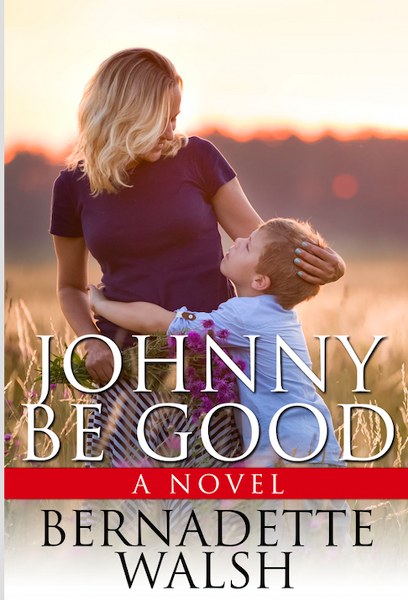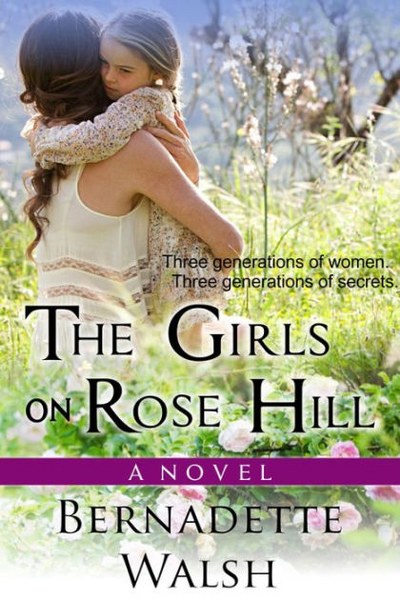North Shore Stories by Bernadette Walsh Book Tour and Giveaway :)
Johnny
Be Good
North
Shore Stories Book 3
by
Bernadette Walsh
Genre:
Women's Fiction, Light Romance
SOMETIMES
A WOMAN DOES WHAT SHE HAS TO DO TO PROTECT HER FAMILY.
Peggy
Lynch has too many children and too much to do. Unlike the pampered
wives in her affluent Long Island suburb, Peggy’s not married to a
doctor or a lawyer. She’s married to an uneducated Irish immigrant
twelve years her junior, and has to work two jobs to help make ends
meet. In between the carpools, the laundry, and the food shopping,
she also has to make sure her youngest son takes his ADHD medicine so
he doesn’t flunk out of high school. Maybe if her lazy husband
would get off his ass and help around the house, she’d have time to
connect with her children and be the type of mother they deserve. But
Peggy lacks that luxury because if it wasn’t for her, the whole
family would fall to pieces.
Years
have passed since Peggy ruled the house and Veronica is no longer her
mother’s obedient little girl. Moving into her childhood home with
her husband and infant twins, she’s starting a new life and should
finally be happy. Right? Wrong.
While
cleaning out her old bedroom, Veronica finds a letter from her
deceased mother. If Veronica were smart she’d burn it and leave her
family secrets buried with the dead. But as her mother so often said,
Veronica’s never been that smart.
She
rips open the envelope and proves her mother right...
But the road between myself and Sean had never been easy. From the day I went to his job site so many years earlier and told him I was expecting Marybeth and that I didn’t expect anything from him, really, I just thought he should know. When he said in an unsteady voice, “Sure, Peg, what kind of man do you take me for? Of course I’ll do the right thing,” from that moment, I knew I’d stolen Sean’s youth and his hopes and dreams. If I’d had any type of conscience I would have set that young man who surely didn’t love me free. Love me? He barely knew me, for heaven’s sake. Sean’s band was having some success and with his leather jacket and tight blue jeans and flashing black eyes it was only a matter of time before he had the young Mollys and Mauras and Kathleens of Long Island and Brooklyn throwing themselves at him backstage. But my McBride fecundity killed those dreams for Sean. My family, Auntie Mary, even my fellow teachers at St. Brendan’s, all thought I’d thrown myself away on a skinny uneducated nobody. But I knew, in the place in my heart I didn’t allow myself to dwell too often, that it was Sean with his passion and his talent who’d thrown himself away on me. And I’d stolen Sean’s future away from him not once but twice. Of course once I had Marybeth and then the twins a year later, Sean’s singing and fiddling days were over. A father of three before he was old enough to vote, Sean was buried in Daddy duty when he wasn’t painting half of Long Island. He played the occasional wedding or bar gig when the band’s new fiddle player couldn’t make it, but for the most part Sean’s time was accounted for and he didn’t wander too far astray from the house on Rose Hill Road. Although during those early years he didn’t really want to wander. The children adored him, although surrounded as he was by their tall sturdy bodies and blonde heads he looks less like their daddy and more like an older brother. But he cared for them and he’d come to feel something like love for me. Sean never said so—he wasn’t that kind of man—but I knew he was drawn to me. When the children were asleep and Auntie Mary was next door at Kitty’s, he’d seek me under the warm eiderdown that had been a wedding gift from his mother. He’d kiss my neck as I mashed potatoes for dinner. He’d slide his hands along my always ample bottom as I walked past him in the hallway. He felt something for me—of that I was sure. And for years that had been enough. Of course a forty year old mother of three is not the same as a woman of thirty-one and cute blond babies are not the same as the grade schoolers with lives and interests of their own. Sean was a twenty-eight year old man with strong arms and jet black hair. The children didn’t need him as much, or at least I think that’s what it felt like to him. He was saddled with me and my sharp tongue and ever-widening hips. Of course there was a pretty little Irish nanny at one of his painting jobs. Of course she’d tossed her thick red hair whenever she brought Sean and his painting crew glasses of cool water. Of course she’d gone to school with one of his cousins and her soft lilting voice triggered a longing for home. Of course she was only in America for six months, saving up some money before she opened a cafe in Killarney with her sister. Of course there’d be plenty of work for Sean, a small apartment above the cafe was theirs for the asking. It was only a matter of time before a pretty Nuala entered Sean’s life. I should’ve been grateful one hadn’t entered it sooner. But I wasn’t grateful. Not at all. When I’d smelt the perfume on his t-shirt, I knew something was going on. I took a day off from school and followed him. I nearly threw up when I saw him kiss a girl as slight and delicate as a fairy. I’d shut my mouth, of course. I stopped taking the pill and plied Sean with steak and wine one night when I sent the children to the neighbors for a sleepover. I went to St. Anne’s every morning and lit candles. By the time Sean and his love had gathered the nerve to tell me— together, wasn’t that admirable of them?—I had news of my own. I was four months pregnant and had waited to tell Sean until I got the all clear from the doctor and all the tests back. I was expecting a boy. A healthy baby boy. But of course I wouldn’t stand in their way. Sean had to follow his heart and if his three children, no four, if his now four children were not enough to keep him here on Long Island, then I would, of course, not object to a divorce. Don’t worry about me, I’d said. I’d manage. Somehow. Seven months later Nuala was back home in Killarney selling scones and Sean was holding his son at the St. Anne’s baptismal font. And for good measure he was back a year and a half later with the black-haired baby girl who’d inherited his mother’s chin and his own black eyes and inky curls. I did what I had to do. To keep my husband here at home with his family. Where—I told myself—he belonged. There were other Nualas and Mollys and Kathleens over the years. But none of them lasted. I pretended not to know and Sean pretended not to know that I knew. Or maybe he didn’t pretend. Maybe he didn’t care whether I knew or not. But while I know—I know Goddamnit—that I stole something vital from Sean, I gave him the two younger children who needed him and loved him in a way the older three could not. And that was not nothing.
The
Girls on Rose Hill
North
Shore Stories Book 2
THREE
GENERATIONS OF WOMEN; THREE GENERATIONS OF SECRETS
Ellen
Murphy spent her childhood in an idyllic house by the sea. A house
surrounded by flower filled gardens and a white picket fence. A house
she fled at eighteen. A house full of secrets.
When
Ellen’s mother Rose, an ex-nun, is diagnosed with terminal cancer,
Ellen reluctantly returns home to care for her and uncovers a clue to
the one secret that has haunted Ellen all her life: the identity of
her father. But that is just one of the many secrets hidden behind
the beautiful facade of the house on Rose Hill.
"The
Girls on Rose Hill is a beautifully written story about the
complicated relationship between three generations of women. It will
touch you, make you laugh, and make you cry. Bernadette Walsh's
subtle use of language, traditions, and manners painted an authentic
portrait of an Irish Catholic family. I loved it."
Suddenly, I was starved. I hadn’t eaten much more than the occasional sandwich during the last few weeks. The restaurant wasn’t open yet for dinner. Brendan slipped the hostess a twenty. She led us to an outdoor patio and brought us two very strong martinis. I didn’t have the energy or the interest to respond to Brendan’s banalities so after a while he stopped talking, and we sat there quietly and drank our martinis while the boats sailed by. By the second martini, the restaurant opened and the waiter bought us two T-Bones, which we ate in silence, although the silence was now companionable rather than strained. By dessert and my third martini, I was feeling a bit “merry” as my grandmother would say, and was ready to talk to Brendan. Grateful for a now appreciative audience, Brendan regaled me with his latest office coup, one of his many attempts to displace his law firm’s current managing partner. We chatted about country club gossip and our sons’ complicated love lives during martini number four. I laughed at Brendan’s flirty banter; he was a philandering asshole, but he could be very funny, especially after a few drinks. It was still light out when I swayed through the restaurant parking lot to my car. Brendan, who was sober, at least compared to me, drove us home. He helped me out of the car and up the steep front steps. “Good evening, Ellen,” Barbara Conroy trilled from her front porch. “Hi, Barbara,” I slurred. Brendan poured me in the front door. I stumbled into the hallway and knocked over the brass umbrella stand. For some reason, Brendan found that very funny. He laughed. “I can’t remember when I’ve seen you this lit.” Brendan steered me toward the stairs. “I’m perfectly fine,” I huffed. “Of course you are, sweetheart, but you’ve had a long day. We both have. Why don’t we go take a nap.” Brendan practically pushed me up the stairs and into Kitty’s room. “This isn’t my room,” I protested weakly, as Brendan slipped the linen shift from my shoulders. “I don’t think this is a good idea.” I moaned as his hands travelled down the front of my body and cupped my still firm breasts. He then gently pushed me onto Kitty’s bed. The old bed creaked under our weight. His mouth expertly covered mine and despite the vow I had taken three years earlier not to be seduced by him again, I responded.
Cold
Spring
North
Shore Stories Book 1
AN
INNOCENT GIRL IS A DANGEROUS THING
Twenty
years ago Maura Lenihan was the curvaceous red-haired teenager at the
center of a political sex scandal. Today, Maura is a thirty-five year
old hospice nurse who spends her days caring for the cancer-ridden
and comatose and her nights reading romance novels. Her life is
boring and safe and just the way she likes it.
However,
Maura’s safe cocoon is now threatened both by the press’ renewed
interest in the twenty year old scandal and the attentions of her
most recent patient -- a thirty year old Wall Street investment
banker whose black hair and blue eyes are oddly familiar.
I hurried across the bleached floorboards, down the narrow staircase to my waiting Honda. My skull throbbed with a familiar ache, as if my head rebelled against any stray thoughts about that summer traveling through its synapses. Twenty years. Wasn’t that long enough? Move on, Maura. Isn’t that what my sister Eileen always said? Move on. If only it were that easy. Mr. Matthews was my last appointment of the day, so I was free to return home. Home. What a strange word to describe my two bedroom rental in the Laurel Gardens complex. Laurel Gardens. More like Loser Gardens. The two years I’d spent there after I’d broken up with yet another boyfriend seemed like an eternity. Laurel Gardens was aggressively manicured. Its gated entranceway with two formidable brick pillars promised security, refuge from the eighteen wheelers and minivans that endlessly barreled down Jericho Turnpike. Less than five years old, the complex had all the modern amenities: high ceilings, granite countertops, even a “clubhouse” at its center where the divorced dads and the few women in the complex under fifty would gather to celebrate their newly single status. Next to the clubhouse was a small pool, that on Wednesdays and weekends filled with sulky children forced to vacate the large colonials still inhabited by their mothers to serve their allotted time with their overly cheerful dads. Despite its stainless steel appliances and bay windows, Laurel Gardens was an overpriced dump with kitchen cabinets that never closed right. Its thin walls kept out neither the cold nor the endless stream of ESPN from each neighbor’s big screen TV, typically one of the few possessions the divorced dads were allowed to move into their new nine hundred square foot cells. Still, for most this was a temporary stop until they moved on with their lives. Few stayed for more than a year or two. I pulled into my assigned parking space and found my next-door neighbor, Rob once again waxing his pick-up truck with care. Rob was often home in the middle of the day and I never saw him dressed in a suit, so I wasn’t sure exactly what he did for a living. He’d only been in Loser Gardens for a few months, so he still had that hopeful glow, as if he really believed things were still going to work out for him. “Hey, Maura.” “Hi Rob.” “Bob.” I winced. “Oh, that’s right. Bob. Sorry.” Bob was somewhere in his early forties, with silver strands shot through his baby fine blond hair. He was tall, with strong arms and a kind smile. When I could be bothered, I wondered how he wound up in Loser Gardens and what had caused him to leave the mother of the twin boys I sometimes saw assist him in his constant car washing and waxing. He smiled. “No problem. Hey, there’s a wine tasting at the clubhouse later. Will I see you there?” “I don’t think so, Bob.” He stopped waxing and his eyes met mine. I’d fended off so many of the divorced dads’ advances over the past two years, my responses had become almost automatic. Most of them were tools, and I didn’t feel even the slightest bit guilty about blowing them off. Some of them had recognized me, which made them even more persistent. But Rob, or rather, Bob, was different. He seemed genuinely nice. Still, the last thing I needed was to get involved with one of the apartment complex’s walking wounded. With my track record, the last thing I needed was to get involved with anyone. “Someday, I’ll convince you. You’ll see.” I smiled at him and dug the keys out of my purse. I thought, “Don’t count on it, Bob.”
I
have always been a bookworm and had always meant to write a novel
“someday.” You know, when I won the lottery and could live in
beach house and feel inspired. Twelve years ago I decided to stop
waiting for my winning lottery ticket and sat down and started
writing. In between work and family obligations, I piled the words on
top of each other until they formed sentences, paragraphs, chapters
and eventually a book. While I’ve hopped around genres, all of my
books to date have a common theme: strong women handling what life
throws at them the best way they can.
My
titles include: Gold
Coast Wives,
The
Girls on Rose Hill,
The
Devlin Witch (Books 1-4 of the Devlin Legacy Series),
Cold
Spring, Johnny Be Good, See Me and
Friends
Forever.
Covers
and other information about my books and my writing can be found on
my website www.bernadettewalsh.com.
DEFINING SUCCESS
BY BERNADETTE WALSH
At the dreaded day job, January is review month. It’s the time of the year when supervisors and co-workers assess my work for 2019, award me a ratings number and determine my compensation. For better or worse, at the end of review month I know where I stand. Good review=more money=success. If only my writing life was so clear cut. I’ve been at the writing game for ten years now, long enough for most people in my life to know about my second life as a novelist. Friends often ask me “how’s the writing going?” That seemingly innocuous questions has some undertones though and I often struggle to say anything more than “fine.” We live in an achievement oriented society. From the age of six, we’re conditioned to strive to be the best: get straight As, be on the honor role, land the lead in the school play, win that game. And of course the achievement train continues long after graduation: get into a good college, get the good job, meet the right guy, live the perfect life. So when people ask me “how’s the writing?” what I really think they’re asking is: Are your books in Barnes & Noble? Are they going to make your book into a movie? Have you made the New York Times bestseller list? Have you made a million dollars like E.L.James? Sadly, the answer to all of those questions remains no. But what does that mean? Am I a successful writer? By those standards, I am not. Some might even say I’m a failure, that I’m just wasting my time. But I love writing. Is doing something you love the definition of success? And there are people who’ve read my books who enjoyed them. One reviewer said one of my books made her cry. Surely having readers love your book is a viable measure of success. Maybe in order to be a successful writer you have to change your definition of success. Most writers will not sell even a tenth of the number of books Nora Roberts has sold and most writers will not be best-sellers -- those are just the sad facts of life. But every day that a writer sits in her chair and pulls something from deep within her soul that is unique and beautiful and real, is in my opinion a day that she is a success. If even one reader can lose themselves in a world that you’ve created out of nothing, then you’re a successful writer. Letting the world define you and prevent you from pursuing your dreams to me is the real mark of failure. Bernadette Walsh writes contemporary and paranormal romance and women’s fiction and has published seven novels. http://www.bernadettewalsh.com
Follow
the tour HERE
for special excerpts, guest posts and a giveaway!












Thank you for hosting me!
ReplyDelete